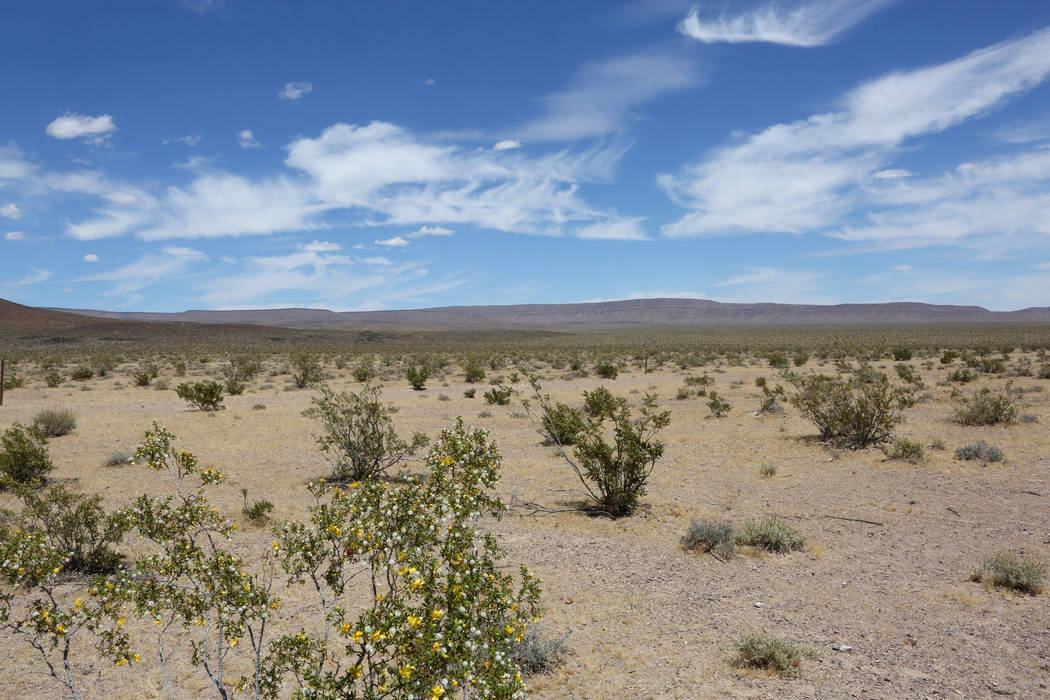
WASHINGTON — U.S. House legislation to revive Yucca Mountain in Nye County would have no significant impact on spending over 10 years, but the uncertainty of the project makes long-term cost increases hard to predict, a report by congressional auditors finds.
The nonpartisan Congressional Budget Office said it was unknown what the cost increases would be if the Nuclear Regulatory Commission approved a license and the Department of Energy constructed a repository for nuclear waste in Nevada.
“CBO has no basis for predicting the outcome of the NRC’s licensing process or whether activities related to the disposal program will receive necessary funding,” according to the report, released Oct. 4.
In 2008, the DOE estimated the cost to build, operate and transport waste to Yucca Mountain would be $96 billion over 100 years. That cost projection came as the DOE filed a license with the NRC to build the facility.
That license was withdrawn by the DOE two years later, under the Obama administration, and the project was shelved.
President Donald Trump included funds to restart the licensing process in his fiscal 2018 budget.
The Senate is still expected to consider a bill this year to address nuclear waste disposal from nuclear power plants, where waste is being stored until the federal government builds a repository or temporary storage sites.
But the House Energy and Commerce Committee has overwhelmingly approved the Nuclear Waste Policy Amendments Act of 2017 that authorizes a restart of the licensing process.
A “score” of that bill by the CBO was needed to move forward with full House consideration of the legislation, which could come as soon as this month.
“The CBO report is seriously flawed,” said U.S. Rep. Dina Titus, D-Nevada. She said the congressional auditors failed to take into account new cost estimates of building and maintaining Yucca Mountain.
In addition, Titus said the report ignores that the Nuclear Waste Fund, established to pay for the permanent storage, will diminish in coming years as older nuclear power plants are shut down.
Reaction from Nye County
Nye County Commission Chairman Dan Schinhofen is one of the most vocal proponents of Yucca Mountain in Nye County. He spoke in September on behalf of the county at the 17th annual RadWaste Summit in Summerlin, where he called for the science to be heard.
“Permanent nuclear waste storage will be expensive anywhere,” he said in a statement this week about the CBO’s findings. “Today’s increasing costs are tied to politics and have nothing to do Yucca Mountain’s location. Nearly $31 billion was paid by utility customers through the years on the promise of Yucca Mountain.”
“Studying, building, developing the needed infrastructure and storage will cost tens-of-billions of dollars no matter where it happens,” Schinhofen said. “Basically, permanent nuclear storage will not be cheaper elsewhere. The only difference will be Nye County and the state won’t benefit from a generational, economically transformational project.”
Timeline
Yucca Mountain was designated by Congress in 1987 as the site for permanent nuclear waste storage. Since the licensing process stopped in 2010, the federal government has failed to move forward on accepting waste from power plants, creating a growing stockpile of waste.
In addition to restarting the licensing process on Yucca Mountain, the bill would increase storage capacity at the Nevada site from 70,000 to 110,000 metric tons of waste, and it would authorize temporary storage at possible sites in states that include New Mexico, Texas and Nevada.
The CBO found that implementing the bill would increase costs by $300 million over the next 10 years. After the year 2027, auditors said the cost of the legislation per 10-year periods could be as little as “a few billion dollars and potentially as much as nearly $20 billion.”
“Whether such higher costs would arise is uncertain and would depend on whether a geologic repository at Yucca Mountain is licensed, built, and put into operation,” the CBO report states.
The Pahrump Valley Times staff contributed to this story.